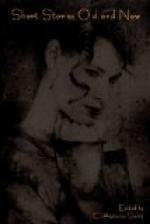Mr. Oakhurst received his sentence with philosophic calmness, none the less coolly that he was aware of the hesitation of his judges. He was too much of a gambler not to accept Fate. With him life was at best an uncertain game, and he recognized the usual percentage in favor of the dealer.
A body of armed men accompanied the deported wickedness of Poker Flat to the outskirts of the settlement. Besides Mr. Oakhurst, who was known to be a coolly desperate man, and for whose intimidation the armed escort was intended, the expatriated party consisted of a young woman familiarly known as “The Duchess”; another, who had won the title of “Mother Shipton”; and “Uncle Billy,” a suspected sluice-robber and confirmed drunkard. The cavalcade provoked no comments from the spectators, nor was any word uttered by the escort. Only, when the gulch which marked the uttermost limit of Poker Flat was reached, the leader spoke briefly and to the point. The exiles were forbidden to return at the peril of their lives.
As the escort disappeared, their pent-up feelings found vent in a few hysterical tears from the Duchess, some bad language from Mother Shipton, and a Parthian volley of expletives from Uncle Billy. The philosophic Oakhurst alone remained silent. He listened calmly to Mother Shipton’s desire to cut somebody’s heart out, to the repeated statements of the Duchess that she would die in the road, and to the alarming oaths that seemed to be bumped out of Uncle Billy as he rode forward. With the easy good-humor characteristic of his class, he insisted upon exchanging his own riding-horse, “Five Spot,” for the sorry mule which the Duchess rode. But even this act did not draw the party into any closer sympathy. The young woman readjusted her somewhat draggled plumes with a feeble, faded coquetry; Mother Shipton eyed the possessor of “Five Spot” with malevolence, and Uncle Billy included the whole party in one sweeping anathema.
The road to Sandy Bar—a camp that, not having as yet experienced the regenerating influences of Poker Flat, consequently seemed to offer some invitation to the emigrants—lay over a steep mountain range. It was distant a day’s severe travel. In that advanced season, the party soon passed out of the moist, temperate regions of the foot-hills into the dry, cold, bracing air of the Sierras. The trail was narrow and difficult. At noon the Duchess, rolling out of her saddle upon the ground, declared her intention of going no farther, and the party halted.
The spot was singularly wild and impressive. A wooded amphitheatre, surrounded on three sides by precipitous cliffs of naked granite, sloped gently toward the crest of another precipice that overlooked the valley. It was, undoubtedly, the most suitable spot for a camp, had camping been advisable. But Mr. Oakhurst knew that scarcely half the journey to Sandy Bar was accomplished, and the party were not equipped or provisioned for delay. This fact




